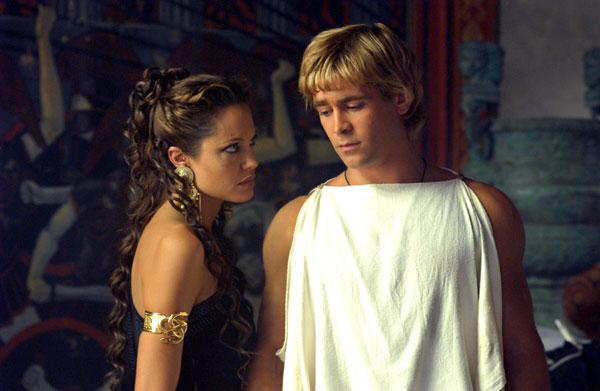
Alexander the Great. Seeker, despot, conqueror, legend…and who knew he anything to do with the Kennedy assassination? Ok, Oliver Stone’s Alexander doesn’t actually pin the events of November 22, 1963 on the Macedonian conqueror, but, to be honest, I kinda wish it had — it might have injected some much-needed energy into the film. Over the past two decades, Oliver Stone has made films that are stunning, controversial, wrongheaded, and unforgettable, but never before has he made one so flat-out dull.
To its credit, I guess, Alexander shows signs of being an absolute train wreck right from the first reel. After a very brief nod to Citizen Kane, which suggested we may at least be getting a gloriously over-the-top outing from Stone this time around, the film settles in to Anthony Hopkins wandering around the set of the “Losing My Religion” video and spitting out long, interminable chunks of Basil Exposition. (Speaking of which, Stone must have been watching his VH1-Classic…there’s a scene on a mountaintop later that seems lifted straight out of Depeche Mode’s “Enjoy the Silence.”) Then, we’ve got Mommy Dearest Angelina Jolie writhing around with snakes for a bit (women = serpents = temptresses = deceivers, get it? Don’t worry, in typical Stone fashion, the point will be beaten into the ground over the next three hours.) Twenty minutes in, by the time young Alexander is channeling the Horse Whisperer, it’s pretty clear we’ve got a real stinker on our hands.
From there on, it’s just a pile-up. Other than a neat camel charge or two, the battle setpieces are completely inscrutable, and not in a good “Fog of War” kinda way. For some reason, the men all speak with Irish brogues, while both women (Jolie and Rosario Dawson) sound like Brides of Dracula. Give them credit, though. Jolie, Dawson, and Val Kilmer (as Phillip of Macedon, by way of Dr. Moreau) seem to be the only three people involved with this project who saw it for what it was and racheted up the hamminess dial to 11.
Much has been made in some reviews of Stone’s decision not to shy away from Alexander’s bisexuality — namely his love affair with the doe-eyed Hephaistion (Jared Leto, who fulfilled close to the same function for Tyler Durden in Fight Club) — and I suppose he should be applauded for it, given the recent trends in Red State country. But, frankly, what with all the earnest looks and pre-established Freudian baggage, it all comes off as high camp, and not nearly as open-minded as it thinks it is. Not that heterosexual relations fare much better, mind you…when Colin Farrell and poor, lovely Rosario Dawson hiss, scratch, and wrestle naked on their wedding night (yes, you guessed it, snake flashbacks are involved), it’s just about the most ridiculous thing you’ve ever seen.
To sum up, Alexander is a flat-out disappointment and easily the worst Oliver Stone film I can think of offhand. This review notwithstanding, it’s not even fun-bad. Think of it more as Alexander And The Terrible, Horrible, No Good, Very Bad Movie.


